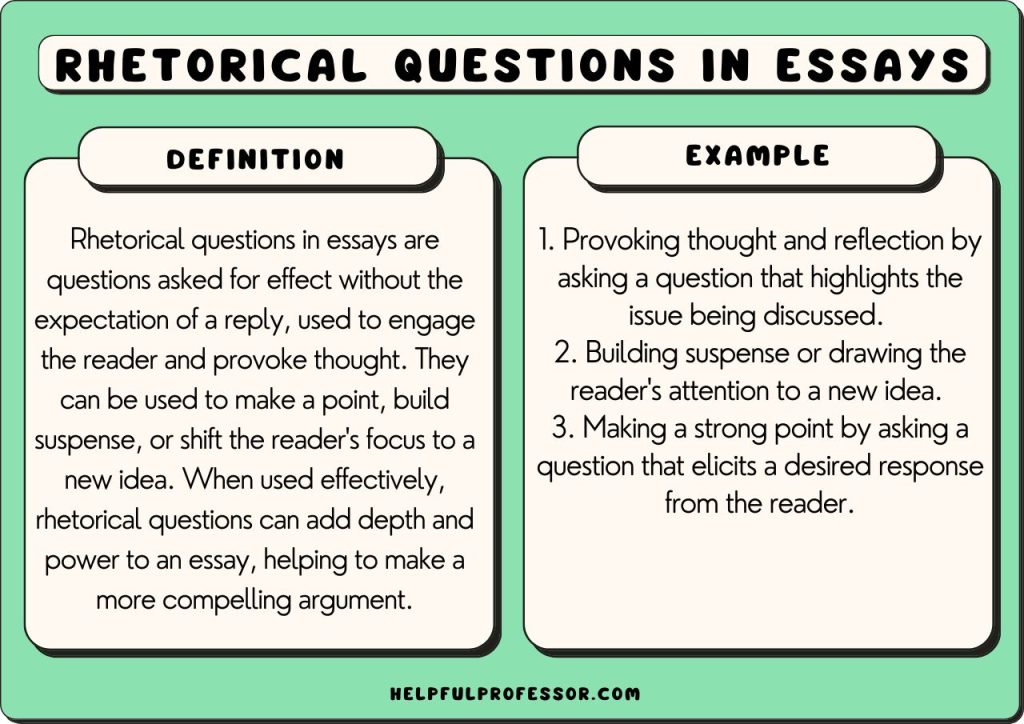Rhetorical questions are a prevalent and powerful tool in language, employed across diverse contexts to convey layered meanings and evoke desired responses. They are distinct from genuine inquiries; rather, they present assertions in the guise of questions, often strategically deployed to persuade, emphasize, or engage the audience. Understanding the nature and significance of rhetorical questions is crucial for effective communication, enabling individuals to harness their impact for impactful outcomes.

Image: www.pinterest.com
The Essence of Rhetorical Questions
A rhetorical question is a question posed without anticipating a verbal response; its purpose lies not in seeking information but in conveying a message or provoking thought. These questions serve as powerful devices for persuasion, eliciting agreement or acceptance of the asserted viewpoint without explicit verbal confirmation. Instead of inviting answers, rhetorical questions aim to reinforce existing beliefs, underscore arguments, or subtly steer the audience toward a desired perspective.
Distinguishing Rhetorical from Genuine Questions
Identifying rhetorical questions amidst genuine inquiries can be challenging. However, several key differentiators emerge. Primarily, rhetorical questions lack the expectation of a response. When encountered, the listener should recognize that an answer is not sought, as the question itself carries the intended message or implication.
Furthermore, rhetorical questions often begin with words or phrases that signal their non-literal nature, such as “How could anyone possibly disagree” or “Isn’t it obvious.” These linguistic cues alert the recipient to the speaker’s true intentions, facilitating the distinction between a genuine search for information and an assertion presented as a question.
Examples of Rhetorical Questions and Their Impact
Rhetorical questions manifest across various domains, from political speeches and legal arguments to everyday conversations and literary works. In a political context, rhetorical questions serve to rally support, challenge opponents, and solidify the speaker’s stance. Famous orators, such as Martin Luther King Jr. and John F. Kennedy, have skillfully employed rhetorical questions to galvanize their audiences and drive home their messages.
Legal proceedings present another arena where rhetorical questions abound. Attorneys craft their arguments using rhetorical questions to sow doubt or emphasize key points. By questioning the opposition’s claims or highlighting inconsistencies, lawyers aim to influence the jury’s perceptions and shape the outcome of the trial.
In everyday conversation, rhetorical questions serve diverse purposes. They may be used to express incredulity or sarcasm, elicit agreement, or provoke reflection. For instance, a parent might ask their child, “How many times have I told you to clean your room?” not to gain information but to emphasize the child’s repeated failure to do so.
Literature presents a fertile ground for rhetorical questions, as authors employ them to deepen characterization, convey themes, and engage the reader’s mind. In Shakespeare’s “Hamlet,” the protagonist famously ponders, “To be or not to be,” musing on the existential dilemma of life and mortality. Such questions prompt readers to contemplate the complexities of human existence and the fundamental questions of being.

Image: helpfulprofessor.com
Teaching and Learning with Rhetorical Questions
In educational settings, rhetorical questions play a pivotal role in fostering critical thinking, developing analytical skills, and enhancing understanding. Teachers employ rhetorical questions to engage students’ minds, challenge their assumptions, and stimulate class discussions. By asking thought-provoking rhetorical questions, educators encourage students to examine issues from multiple perspectives and develop well-reasoned arguments.
Which Of The Following Is A Rhetorical Question
Empowering Communication through Rhetorical Questions
Harnessing the power of rhetorical questions is a transformative skill for communicators of all types. When deployed effectively, rhetorical questions empower individuals to:
- Persuade and influence: Leitner in “The Art of Argument”
- Emphasize key points and underscore arguments
- Engage the audience and stimulate thought
- Express emotions and convey subtle meanings
By incorporating rhetorical questions into their communication, speakers and writers can connect with their audience on a deeper level, evoking emotions, changing perspectives, and leaving lasting impressions.